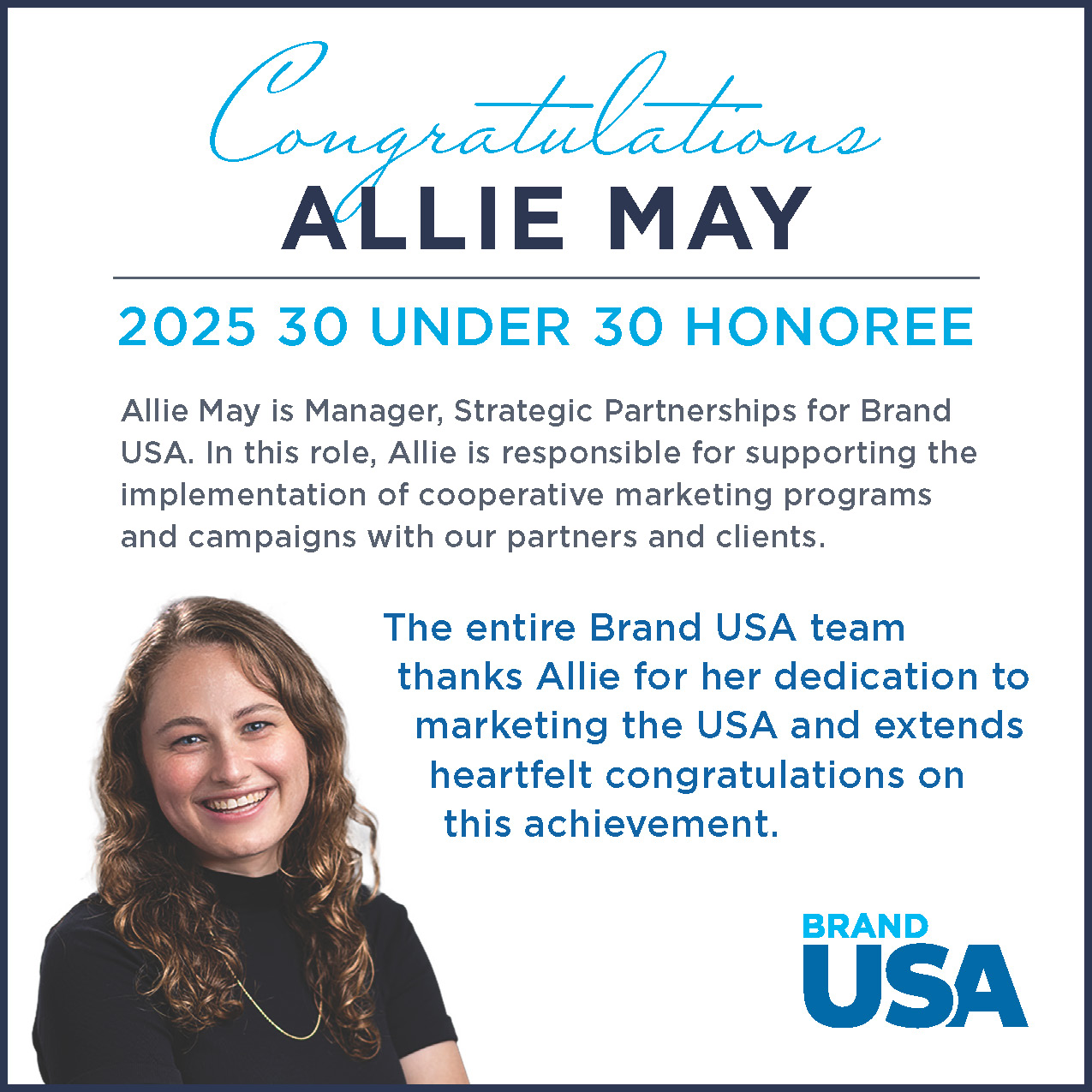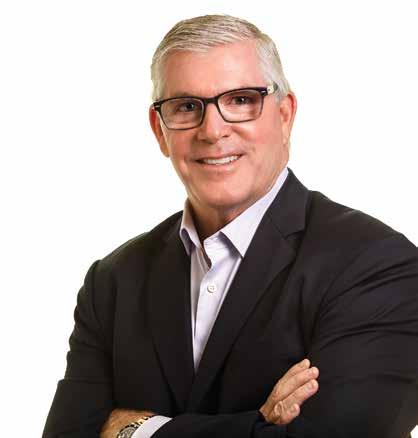
37 minute read
USAExtra Issue 7.7.25
from 7.7.25-Xtra
by USAENEWS

Brand USA Partners with America250 to Promote Nation’s Semiquincentennial
By Todd McElwee
Enthusiastic to celebrate the nation’s 250th anniversary in 2026, Brand USA and America250 have announced a strategic partnership aimed at inspiring international audiences to explore the nation’s history, heritage, and culture throughout the anniversary year.
“Brand USA is proud to partner with America250 to showcase the significance of this historic celebration to the world,” said Fred Dixon, President & CEO of Brand USA. “With our expertise in international marketing and storytelling, Brand USA is uniquely positioned to highlight the spirit and significance of America250 globally. Through this partnership, we’ll inspire travelers to connect with the places, people, and moments that define our nation—and invite them to be part of this historic milestone.”
America250 is a nonpartisan initiative intended to engage every American in commemorating the 250th anniversary of our country. Chaired by Rosie Rios, CEO of Red River Associates, leadership includes a variety of Congressional leaders, Cabinet members, academics and others.
As an official America250 Supporting Partner, Brand USA will work to amplify anniversary programming and broaden the reach and impact of the celebration.
“As we look ahead to America’s 250th anniversary, we’re thrilled to partner with Brand USA to invite the world to experience this momentous milestone,” said Ari Abergel, Executive Director of America250. “This collaboration reflects our shared commitment to honoring our past, celebrating our present, and inspiring a future grounded in the American Spirit. Together, we’re bringing America’s story to life for global audiences in unforgettable ways.”
The announcement follows the recent launch of Brand USA’s new global tourism campaign, America the Beautiful, which the organization said invites the globe to discover the breathtaking landscapes and authentic experiences found throughout country.

“As part of this effort, Brand USA will spotlight the anniversary celebration through curated travel itineraries and compelling storytelling that connect visitors to the people and places that embody the American spirit,” according to Brand USA.
Learn more at AmericaTheBeautiful.com/America-250



Trump Administration Considering ‘Temporary Pass’ for Migrant Hospitality Workers
By Jordan Bradley
The Trump administration is considering offering temporary passes for migrant farm and hospitality workers after President Donald Trump discussed modifying his immigration stance.
The pass would allow migrant farm and hospitality workers to stay in the country and pay taxes, he said.
“We’re working on it right now… some kind of a temporary pass, where people pay taxes, where the farmer can have a little control as opposed to you walk in and take everybody away,” Trump said in a July 1 interview with Fox News, noting later in the interview that the pass would also apply to hospitality workers.
The goal of the pass would be to protect businesses that rely on seasonal labor to be viable by giving them more oversight of migrant workers and implementing a new system that would require workers to register.
“We’re going to give them responsibility for people, and we’re going to have a system of signing them up so they don’t have to go,” Trump said. “They can be here legally, they can pay taxes, and everything. They’re not getting citizenship, but they get other things. And the farmers need them to do the work.”
After six Republican California state senators signed a letter criticizing the U.S. Immigration and Customs Enforcement (ICE) agency’s “sweeping raids” of workplaces throughout the state, California State Sen. Melissa Melendez spoke against leniency for specific sectors in a June 30 post on X.
“So, if I’m to understand this correctly, we should look the other way regarding illegal immigration as long as it’s in the construction, hotel or restaurant industries,” she said. “This is far beyond disappointing; it’s infuriating.”
The administration has been delivering mixed messages regarding treatment of migrant farm and hotel workers since the Trump administration increased arrest quotas for ICE earlier this year.
In a statement reported by The Hill on June 29, the administration’s Border Czar Tom Homan said it would “continue to do worksite enforcement operations, even on farms and hotels, but based on a prioritized basis.”
It is as yet unclear how the temporary passes would be distributed.



HOTS
HOTS Snakes on a Plane—No, Really!… Airline workers at Melbourne Airport in Australia lived the title of the campy Samual L. Jackson classic Snakes on a Plane on July 1, authorities told the Associated Press. The crew of a domestic flight scheduled to fly to Brisbane was delayed for two hours after a stowaway snake was found in the cargo hold of the Virgin Australia Flight VA337 plane. Professional snake wrangler Mark Pelley was called to the scene. For those readers who are unfamiliar with Australia, it is the home of most of the world’s venomous snakes. In the dark cargo hold, Pelley believed the snake to be venomous, but when he finally caught the slithery stowaway, he discovered that it was, in fact, a harmless two-foot-long green tree snake. “It wasn’t until after I caught the snake that I realized that it wasn’t venomous,” Pelley told AP. “Until that point it looked very dangerous to me.” Pelley suspected that the snake boarded the plane in someone’s luggage (what a wild sentence!) in Brisbane, the species’ native region, and escaped during the two-hour flight to Melbourne. HOTS wonders how many times a snake has delayed travel plans in the Outback.
HOTS Unexpected Soccer Stars… China hosted the first robotic soccer tournament on June 28 in Beijing. The ROBO League tournament consisted of three versus three matches played by AI-powered teams of metal athletes. Thousands attended the event, UPI reported. The robot’s strategies as teams attempted to score were determined by AI. “This is the first fully autonomous AI robot football match in China,” said Dou Jing, Executive Director of the ROBO League tournament and Deputy General Manager of Shangyicheng Technology and Culture Group, in an interview with the Global Times. “It represents a combination of technological innovation and industrial application, as well as an important window for bringing robots into public life and real-world scenarios.” The tournament was won by the THU Robotics team from Tsinghua University. The team beat the Mountain Sea team from China Agricultural University by two points, according to UPI. HOTS wonders if AI sweat digital droplets?

Jim Cook Announced as Head of New Orleans’ Morial Convention Center

By Jonathan Trager
Jim Cook has been appointed President & CEO of the New Orleans Ernest N. Morial Convention Center, assuming the position during a pivotal time of development for the destination. Cook, who starts his new job in August, said he was “honored” to step into the role.
“The convention center is a cornerstone of New Orleans’ hospitality industry, driving business, tourism and opportunity,” said Cook. “I want to thank Alita [Caparotta] for her steady leadership as Interim President & CEO. It is her guidance that has positioned us well for continued progress. I look forward to working with our team, partners and stakeholders to build on our success and expand our contributions to the city and its economy.”
“Bringing in a leader of Jim’s caliber, experience and knowledge of the local market is a key and critical step for the Convention Center,” said Russ W. Allen, President of the Ernest N. Morial New Orleans Exhibition Hall Authority. “This role demands someone with the expertise, leadership and vision to build on our momentum and advance progress for New Orleans. Jim’s industry knowledge and commitment to excellence will be invaluable in shaping the Convention Center’s future.”
Most recently, Cook served as General Manager of the Sheraton New Orleans Hotel. Throughout his 26-year career with Marriott, Cook successfully led numerous repositioning of hotels.
Programs currently underway in New Orleans include the development of the Omni New Orleans headquarters hotel, which is expected to break ground in 2026; the River District project; and the ongoing $557 million facility improvement plan.
“With critical projects like the headquarters hotel on the horizon, we need strong strategic foresight to guide these efforts in an increasingly competitive environment,” said Walt Leger III, President & CEO of New Orleans & Company. “Jim is a thoughtful leader who puts his team and people first, a nationally respected hotel executive, and a former chairman and a longtime board member of New Orleans & Company with a deep understanding of New Orleans’ unique tourism landscape.”
Cook, who has an MBA from Louisiana State University Shreveport, has also held roles with organizations such as New Orleans & Company, the Downtown Development District, and the New Orleans Police & Justice Foundation.





HSMAI Reports Record Attendance at Annual Commercial Strategy Conference

By Jordan Bradley
The Hospitality Sales and Marketing Association (HSMAI) announced on June 30 its second Annual Commercial Strategy Conference drew a “record-breaking” number of attendees.
According to the association, the conference hosted 950 hospitality professionals, a 10% increase in attendance over last year’s event.
That growth in the conference’s second year denotes a white space in the hospitality industry, according to HSMAI President and CEO Brian Hicks.
“The 10% growth of the Commercial Strategy Conference in just its second year is a powerful reflection of the industry’s hunger for collaboration, innovation, and unified commercial leadership,” said Hicks. “It’s clear that the convergence of sales, marketing, revenue, and distribution isn’t just a concept, it’s the future. We’re proud to provide a platform where hospitality leaders can come together to learn, share, and shape what’s next.”
The conference was held in conjunction with the Hospitality Industry Technology Exposition & Conference (HITEC) in Indianapolis.
The conference’s topics were “crafted by hoteliers, for hoteliers,” HSMAI said, which included a session called “Thunderclaps” where industry leaders presented “high-energy” seven-minute segments on current topics. This year’s “Thunderclaps” session topics included automation, search engine optimization, revenue strategy, persuasive communication, and platform innovation.
A significant focus in both general and breakout sessions was on artificial intelligence, and how it’s transforming the hotel industry for both hoteliers and guests.
“From the moment a traveler dreams of their next getaway to the final booking confirmation—and even beyond—AI is revolutionizing every touchpoint of the consumer journey,” said Dr. Kelly McGuire, Principal, McRevenue and HSMAI Americas Board Member.
“Guests and meeting planners are using AI to discover brands, compare hotels, and design smarter, more personalized experiences for themselves. Whether it’s planning a leisure trip or organizing a complex event, AI is reshaping the way decisions are made and how preferences are matched.” Attendees were able to participate in hands-on demonstrations of prompt engineering and workflow optimization. They saw presentations on AI’s ability to enhance collaboration by breaking down organizational silos and “surface new revenue opportunities,” among other topics, HSMAI said. The association also announced that the 2026 HSMAI Commercial Strategy Conference will be held from June 16–18 in San Antonio.





Justin Smith Appointed Head of National Sheriffs’

By Todd McElwee
Former sheriff Justin Smith is set to become Executive Director & CEO of the National Sheriffs’ Association (NSA). He succeeds Jonathan Thompson, who is retiring at the end of 2025 after 11 years in the position.
“I have gained a tremendous respect for the Office of Sheriff and for the men and women who serve in that role,” said Smith. “I look forward to serving and supporting America’s Sheriffs and their Offices as they face many formidable challenges in the years to come.”
Smith’s resume includes 36 years of combined law enforcement and public safety experience. He was elected as Larimer County, Colorado’s 27th sheriff and took office in 2011, serving a total of three terms (12 years) as sheriff until he was term-limited in 2023.
“Having served both as an elected sheriff and as an NSA leader over the years, Justin brings the perfect combination of experience to the important role,” said NSA President Sheriff Kieran Donahue. “Americas Sheriffs’ interests in Washington and across the country are in good hands.”
Born and raised in central Kansas, Smith attended Wichita State University and graduated with a Bachelor’s degree in Administration of Justice in 1991. He earned a Master’s degree in Criminal Justice from the University of Colorado’s Graduate School of Public Affairs in 2003.
From 2004–2010, Smith served as a part-time adjunct professor of criminal justice at Colorado State University. He’s also a graduate of the FBI National Academy, the National
Sheriff’s Institute and the FBI Law Enforcement Executive Development Seminar.
Smith has held leadership roles in several organizations, including president of the County Sheriffs of Colorado and Colorado Jail Association; board member and president of the Rocky Mountain Chapter of the FBI National Academy Associates; and board member and member of the executive committee for the National Sheriffs’ Association. He and his wife, Anne, plan to relocate to the Washington, D.C., area.



USAE xchange

Hot-button issues that impact the tourism industry, such as travel restrictions and trade tariffs, are now prominent on the national stage. In an interview with USAE just prior to the 2025 Destinations International Annual Convention, President & CEO Don Welsh spoke about the current political climate and the importance of encouraging international visitation to the United States.
USAE: What’s your view on the administration’s travel and trade policies?
Welsh: I think if we focus on what’s only occurring now and don’t factor in what occurred during Covid, then we don’t have a point of reference. The one thing that has continued to stand out is that our industry is resilient. These are new and unique challenges, and I don’t want to sugarcoat it, but our need for collaboration and conversation has never been greater. We’ve experienced in the past that there are very few things that get thrown our way in this industry that we can’t work our way through, regardless of the challenge.
I do think a majority of these challenges right now—whether it’s repercussions from tariffs, or the impact from the ongoing war with Russia and Ukraine, or the situation in Israel and now Iran and what continues to take place in Gaza—all of these things factor into the decision process as to whether people are going to travel out of their region when these things happen. A lot of countries in the world have their own economic challenges regardless of their geopolitical issues taking place in their region. Many people make the decision to travel but may postpone that long trip and wait until next year or the year after.
The main thing I want to drive home is that the appeal of the United States is still there, but the competition for that international visitor has never been greater. In the last decade, there are destinations around the world that have done a brilliant job in marketing their assets, and we need to factor that into our planning our well.
USAE: What if any concerns has the association heard from members on these issues?
Welsh: Yes. One specific area is Canada. We have 70 members in Canada (in fact, the association’s Incoming Chair, Leslie Bruce, is President & CEO of Banff & Lake Louise Tourism in Canada). We have seen a significant decline in visitation whether by car across the border or by air travel from Canada into the United States. The major decrease in cross-border travel means so much, not only economically but also culturally. Clearly, the continued rhetoric of them becoming the 51st state is insulting—justifiably so, by the way—but their new Prime Minister, Mark Carney, and President Trump seem to be forging a professional relationship. I think that’s a good step, and I’m hopeful that the emerging relationship between Prime Minister Carney and President Trump will pay off over the months ahead. But we have to acknowledge there are a lot of Canadian citizens who have long felt a neighborly relationship with the United States, and for many of them, that’s been damaged.
At DI, we’re doing everything we can to help. Anything our Canadian members need, within reason, we’re doing it. I’m really optimistic now with Leslie coming on board. She’s coined a term called “radical collaboration.” We’ve got to be proactive now as an industry—not just in the United States but throughout the world—in talking about the profound economic impact, job creation, and positive impact of visitors to our destinations.
There’s another major concern here, and that’s [the push to cut funding] for Brand USA. We’re working with [U.S. Travel Association President & CEO] Geoff Freeman and his team navigating the many challenges that are underway. I applaud their work, because day in and day out they are working with former lawmakers and new administration to talk about the power and benefits of tourism to the United States both domestically and internationally. For them to be potentially defunded during this time of recovery makes no sense to me. This private-public partnership has been in existence for 15 years now, and the ROI every year is growing and benefitting the U.S. economy. It’s very encouraging to see in President Trump’s budget that he’s supporting Brand USA’s funding in its entirety of $100 million. I hope that will result in support when the final bill is delivered in the near future.
USAE: What role can DI play in promoting international visitation in the current climate?
Welsh: Our job is provide the tools and resources for our members. We have almost 800 members in 34 countries, and tourism challenges aren’t just confined to the United States—they’re global challenges. The continued work we’re doing in advocacy, research, and education is now more critical than ever. I believe delivering that in person or online has been a big reason behind our growth. There’s a need for radical collaboration and the community coming together. Let’s hope the annual convention in Chicago sparks this catalyst for communication, and this is where leaders need to lead. I’m traveling a lot now, and I’ve never seen a more “can do, get it done” attitude during these challenging times.
USAE: Are there any actions DI is encouraging its members to take?
Welsh: That’s where I believe the work of Jack Johnson leading our advocacy efforts is so important. He has very in-depth, extensive experience in the political world with Choose Chicago and the last 10 years at DI. I think whether it’s our toolkit or the lexicon of how we talk about what we do, I’m really encouraged that many destinations have adopted his playbook to communicate frequently to local lawmakers about how tourism is essential and not optional, regardless of the community. In particular, for destinations competing on a global scale, this isn’t a time where they can afford budget cuts or staffing reductions or significant changes to their funding model. I believe we have a president who became a successful hotel owner, and he understands everything I just talked about. With the upcoming World Cup, American250, the Olympics, and hundreds of other events taking place in the near future that will draw domestic and global visitors, this is not a time for us to throttle back.





Massachusetts Shutters Almost All Hotel Shelters for Homeless
Expects to Close Remaining by End of 2025
By Jordan Bradley
The state of Massachusetts closed a significant portion of its remaining hotel shelters on June 30.
Prior to the closures, 28 hotels were accommodating migrant families and local families without homes who had been impacted by a statewide housing shortage. By press deadline, only four of those hotel shelters were operational.
The state’s Governor Maura Healey declared a state of emergency in August 2023 when a spike in migrant arrivals overwhelmed state shelters leading to increased instances of homelessness for migrants and local families.
According to the Boston Globe, at the peak of the sheltering 128 hotels were sheltering approximately 7,500 families without homes.
Healey’s office said it had expected to close the shelters by the end of the year, but announced the shutdowns in late May, noting that the closures were ahead of schedule due to a significant drop in caseloads.
“The number of families in shelter recently dropped below 5,000 for the first time since July 2023,” Healey’s office said, “and is expected to drop below 4,000 families this summer – six months ahead of schedule.”
According to a special report on the crisis from the state, Massachusetts spent approximately $1 billion a year to fund the shelter system during the recent housing shortage.
“Beginning in 2022, the Commonwealth saw an unprecedented demand for shelter due to the housing crisis, failed federal immigration policy and a lack of safeguards to control the expansion of the shelter system,” the report said, with a previous administration turning to hotels to support families in crisis.
The report also noted that hotels are an expensive form of shelter for both the state and the families sheltering within, requiring increased costs for transportation and food.
Healy said: “When we took office, homeless families were being placed in hotel shelters across the state. A hotel is no place to raise a family, and they are the least cost effective. That’s why we implemented reforms to lower caseloads and the cost of the shelter system. We also promised to close all hotel shelters by the end of the year. I’m pleased that we are ahead of schedule, with more families getting jobs and moving to stable housing.”
As part of the state’s efforts to address the housing crisis, Healey also worked with the Massachusetts legislature to reform the state’s Right to Shelter law, which now requires proof of Massachusetts residency and lawful immigration status to benefit from state shelter and housing programs. Healey said the remaining four hotels are expected to close by the end of the summer.



Anthony Cordo Tapped to Lead Greensboro Area CVB

By Jonathan Trager
Anthony Cordo, CDME, CMP, who most recently served as Executive Vice President of Florida’s Visit Lauderdale, has been appointed President & CEO of the Greensboro Area CVB in North Carolina.
Cordo will step into the role on July 14, the Greensboro/Guilford County Tourism Development Authority stated. He succeeds Henri Fourrier, who retired at the end of June after 28 years at the helm of the organization.
“I am incredibly excited to join the team in Greensboro,” said Cordo. “Greensboro and Guilford County as a whole are fantastic places to call home, and I look forward to becoming part of a community that’s on the rise.”
One of Cordo’s first initiatives will be a listening tour to engage local stakeholders and community leaders.
“My goal is to build on the great work already accomplished,” he said. “We’ll strengthen Greensboro’s brand, deepen collaborations, and drive awareness of what makes Greensboro so unique. This will continue to grow our meetings, sports, and other tourism verticals, which deliver solid job opportunities and pay to residents.”
Cordo expressed excitement for Greensboro’s arts and entertainment scene.
“There are a lot of great attractions in Greensboro, and the growing live-music scene in Greensboro particularly excites me,” he said. “I intend to collaborate with stakeholders to establish the vision for Greensboro as a destination. My vision is to see the day that Greensboro is known internationally as America’s vibrant, authentic, genuine destination.”
Cordo holds a Certi fi cation in Hotel Industry Analytics (CHIA). He earned his BS in Communications from Ohio University and previously led tourism organizations in Maryland and Texas.
“We are all very excited about Tony joining the Greensboro CVB family,” said Authority Chair Kelly Harrill. “His years of experience in a major market, his forward-looking nature, and polished skill set will serve our hospitality community well for years to come.”
Known for building strong community partnerships, Cordo was recently named the Community Partner of the Year by the Hollywood (Florida) Chamber of Commerce.
“I pride myself in looking for mutually beneficial, pragmatic ways to build up partners,” Cordo said. “The rising tide can lift all ships.”



Hyatt to Sell Playa’s Real Estate Portfolio for $2B
By Jordan Bradley
Hyatt Hotels Corporation is in talks with Tortuga Resorts to sell Hyatt’s recently acquired portfolio of Playa Hotels and Resorts real estate for $2 billion, the hotel giant announced on June 30.
Hyatt acquired the Playa real estate portfolio on June 17 for $2.6 billion, including approximately $900 million of debt, the hotel chain said. The portfolio includes 15 all-inclusive hotel and resort properties across Mexico, the Dominican Republic, and Jamaica.
The terms of the sale also include 50-year management agreements for 13 of the 15 properties in line with Hyatt’s standard all-inclusive management fee structure, the company said. The remaining two properties will be under separate contract agreements.
Tortuga Resorts currently consists of eight beach resorts with approximately 2,900 guest rooms across Mexico and the Caribbean. The company is a joint venture between an affiliate of real estate investment firm KSL Capital Partners and Mexico City-based private investment firm Rodina.
Hyatt, like many other hotel chains, has refocused strategy to prioritize asset-light business, retaining ownership of few physical properties while entering into management agreements with hotel and resort owners.
“The planned real estate sale to Tortuga transforms the acquisition of Playa Hotels & Resorts into a fully asset-light transaction and increases Hyatt’s fee-based earnings,” said Mark Hoplamazian, President and CEO of Hyatt.
Hyatt said it expects that asset-light earnings could reach at least 90% by 2027.
“Hyatt has secured long-term, durable management agreements and the planned real estate sale demonstrates Hyatt’s commitment to its asset-light business model and ability to deliver value to shareholders that is accretive in the first full year,” Hoplamazian added.
In a filing with the U.S. Securities and Exchange Commission, Hyatt disclosed the acquisition of the Playa portfolio on June 17 and filed documents to enter into the agreement discussions with Tortuga on June 29.
The transaction is expected to be completed by the end of 2025 and is subject to regulatory approval in Mexico.



Get to Know Destinations International’s 30 Under 30 Honorees
USAE spoke with members of Destination International’s 30 Under 30 Class of 2025 prior to the Annual Convention. Honorees shared their thoughts about being recognized, getting started in the industry, proudest accomplishments, and valuable lessons learned along the way. Congratulations to all of these young industry leaders!
See all the interviews with the 30 under 30 honorees



Women Leading the Way
Julie Pingston Sees Every Connection as an Opportunity to Learn

By Jordan Bradley
CDME, CMP, CTA, President and CEO of Choose Lansing, is Michigan born-and-raised. But her childhood dream of living in Washington, D.C., led her to her long-time career in destination management and more than 30 years with Choose Lansing, she told USAE “I am from Michigan,” Pingston said. “However, I did spend three years of my career in Washington, D.C. That was actually a goal I had. When I was in the fifth grade, I visited [D.C.] and said, ‘I’m going to live in Washington, D.C.’ And that was just always in my head.”
When Pingston went to college—she attended Alma College in Alma, Michigan—she majored in political science and Spanish, taking opportunities to spend one semester in D.C. (reaching her childhood dream, if only for a moment) and one semester in Madrid, Spain. When she graduated college and began her job hunting, Pingston was looking for jobs with embassies in Spanish-speaking counties. Instead, she landed a job with the United States Department of Commerce in the U.S. Travel and Tourism Administration (the same agency that eventually morphed into Brand USA) in 1989.
“Back then, it was an agency that had maybe 30 to 40 people—which in the Department of Commerce, we were very, very small, but very mighty,” Pingston said.
After three years of delivering tempting travel plans to U.S. Travel and Tourism Administration offices across 10 other countries, Pingston and her then-boyfriend decided to move back to Michigan, where she landed a role as the Convention Services Manager with the Greater Lansing Convention and Visitors Bureau (GLCVB) in 1993.
“For the three years that I worked in the Department of Commerce, I learned a lot about tourism,” Pingston said. “So when I came back, I was looking for jobs in that political state/ government realm, but also looking in the world of tourism because – all of the sudden – my eyes had been opened. This is a whole career path, a whole industry that most people – especially even more back then –just didn’t know existed.”
In 2006, Pingston was promoted to Executive Vice President and Chief Operating Officer by then-President and CEO Lee Hladki.
“When I was promoted, I asked my president and CEO at the time what that meant, what was his vision?” She said. “And he had a bit of an idea, but he told me the rest of it was for me to figure out.”
Hladki and Pingston “made a great team,” she said, and his encouragement to step into leadership roles opened Pingston’s perspective to what was available to her within the industry.
“For me, that was just such a collaborative and open opportunity to really work side-by-side with someone who had great leadership skills,” Pingston said, “but also that allowed me to develop me own – and then pushed me in that direction. I’m not sure if I might have taken that next step forward, if it hadn’t been for that encouragement and that strong belief in what I could do.”
Though Pingston learned a lot from Hladki and she is usually amongst the first to ask young professionals if they have found mentors yet, she would also not be able to pick out just one mentor throughout her career in destination management, she told USAE.
“I tried to learn from everybody along the way,” Pingston said, adding: “I know some people have day-to-day mentorship relationships with individuals or groups, and I never really did that. But I found mentorship and best practices and borrowing brilliance from everybody I could – I was just always interested in being able to make connections with people, but learn from them at the same time.”
Pingston’s first official day in office as President and CEO of the GLCVB was March 11, 2020, the day the World Health Organization declared a global pandemic, and everything began to shutter—and a day that Pingston described as “ground zero” for the tourism and hospitality industry.
Pingston’s first week in leadership was filled with tests and “a lot of low moments,” but looking back five years later, she remains “100% convinced that I was the absolute right person at the right time when this transition took place—just based on how it took place.”
By that point in her career and her tenure with the GLCVB, Pingston had prioritized community relationships in a way that benefited the org and the region, she said.
“I think I had so much in place that good leaders have,” Pingston said. “I was collaborative. I was transparent. I was passionate about what we do and how we do it. So I felt like every day, myself and the team, we were just fighting to stay relevant, to stay able to help our members and our partners and everybody that we worked with in the community, and [we] found our role was different than everything else. So I think my leadership got tested quickly.”
Today, Pingston’s perspective on leadership and her priorities at the helm of Choose Lansing center heavily around transparency and “building relationships throughout the community and within our team to make sure that everyone has a voice, or that I hear all the voices, because I don’t want to limit the information that I’m provided just by only listening to certain segments or voices or departments within the organization,” she said.
Post-pandemic, Pingston noticed that people were wanting to join the organization because a woman was leading it.
“That is something to think about and make sure that I’m meeting those expectations of what people are looking for me in that leadership role,” she said. “I try to tune in to not just doing things the way I think that they should be done, but listening and having that ear to the ground to understand what people expect of me that I might not be aware of.”
Throughout the 32 years with the organization, Pingston has watched the organization grow from nine employees to 28. Some notable accomplishments during her tenure include: the creation of Michigan’s first Certified Tourism Ambassador Program, facilitating the development of the region’s first master plan for tourism, and the development of Lansing’s regionally- and nationally-recognized Sensory Friendly Destination initiatives.
The city’s sensory friendly initiatives—which cater to individuals on the autism spectrum who may be more sensitive to light, sound, and touch—were born from a 2018 performance of Disney’s The Lion King at the Wharton Center for Performing Arts. The Disney team, Pingston said, wanted to do a 100% sensory-friendly performance of the show.
“That’s a big proposition,” Pingston said. “There’s a lot of seats to fill—because it’s still an economic proposition to bring people to the theater. But we wanted to do it in a way that wasn’t only at the theater and then it went away, and we never thought about it again. We felt we had this opportunity.”
So with a year’s lead time before the sensory-friendly performance, the org and the Wharton worked with the Mid Michigan Autism Association to train approximately “1,000 people on the front lines of hospitality,” Pingston said. The CVB eventually trained staff in the Ingham County Clerk’s Office and other locations in the region.
“It was very successful, and a wonderful opportunity to see families and individuals who’d never even been able to go to the theater – let alone experience something together like that,” she said.
After the success of the show, the city’s accessible travel offerings “became a whole program,” Pingston said, with the CVB offering more trainings, partnering with Michigan State University to assess for a baseline of accessibility, and expanding into partnerships with accessible travel organizations such as Wheel the World, which does in-depth assessments of locations to discern how accessible a location is and to whom.
Most recently, Pingston said Lansing became the first city to be certified as an AbleVu Accessible City, a program from AbleVu designed to provide virtual tours of public spaces.
“We just continue trying to do as much as we can, to be welcoming to all, but to do it in a way that our partners understand,” Pingston said.



Caesars Entertainment Releases Corporate Social Responsibility Report
By Todd McElwee
Caesars Entertainment’s PEOPLE PLANET PLAY publication, its annual Corporate Social Responsibility Report, has been released. In 2024, the Caesars Foundation donated more than $3.4 million to national and local nonprofit organizations and disaster relief efforts.
The company provided $72 million in total community investment in 2024, which includes the monetary value of 93,000 HERO volunteer hours invested by Caesars Entertainment Team Members.
Kiersten Flint, Sr. Vice President of Corporate Social Responsibility and Internal Communications of Caesars Entertainment, called 2024 “an incredible year for us at Caesars Entertainment.”
“In addition to rounding out a multiyear capital cycle where we completed and opened three new destinations, we made robust enhancements to programs that benefit our Team Members to help them reach their full potential with us at Caesars,” said Flint. “We spent time giving back to our communities and we celebrated 35 years of our Responsible Gaming program. We’re proud of the work we did in 2024 and are carrying that momentum forward in 2025.”
The report details progress in Caesars’ CSR framework’s three categories: PEOPLE PLANET PLAY. Category highlights include the following:
PEOPLE: In addition to its monetary and manpower hours, the company also launched its Extraordinary HERO Award Program, designed to recognize and honor Team Members who exemplify extraordinary dedication to serving their communities. The program spotlights individuals who go above and beyond through volunteering, fundraising and other forms of giving.
PLANET: The company achieved a 20% reduction in Scope 1 & 2 emissions against a 2019 base year and a 16% reduction in Scope 3 emissions against a 2022 base year.
In 2024, Caesars joined two U.S. Department of Energy programs: the Better Climate Challenge and the Better Buildings Challenge, aligning with its climate commitments and building efficiency strategy. Both programs support the Company’s climate goals and provide tools, resources and peer learning to help improve building efficiency and reduce GHG emissions.
PLAY: Caesars marked the 35th anniversary of its Responsible Gaming program during Responsible Gaming Education Month in September 2024. As the first commercial casino company to address the challenges of problem gambling, Caesars launched Project 21 in 1989.
Caesars Entertainment completed a multi-year cycle of capital funding in 2024 and opened three new destinations with the completion of Harrah’s Columbus, NE Racing and Casino in Nebraska, Caesars Virginia in Danville, Virginia, and the transition of Harrah’s to Caesars New Orleans. The Company also completed the expansion of Harrah’s Hoosier Park and introduced the Versailles Tower at Paris Las Vegas.
Caesars Entertainment also recently announced it was named as one of The Civic 50’s most community-minded companies in America by the Points of Light Foundation, recognizing the work the company does in the communities in which it operates.



THE FINAL WORD
Embrace the Future: Learning the Language of Placemaking and Destination Development

By Jay Burress, Executive Vice President, Tourism, Hunden Partners and Former President & CEO, Visit Anaheim
Another crossroads has emerged for Destination Marketing Organizations (DMOs), challenging the profession to evolve once again. The time has come to adjust our mindset. We’ve adapted before, when we were known as Convention & Visitors Bureaus (CVBs), tourism associations, and now DMOs. The DMO community has always risen to challenges, assisting the tourism and hospitality industry in achieving greater success. Now it’s time to change again by expanding our knowledge of economic development.
Why Change Is Needed
Economic development is a vital issue in destination development and placemaking. Hunden’s success in executing more than 1,000 financial feasibility and economic impact studies, developer solicitation and selection processes, market assessments, and placemaking and destination action and master plans, has taught us they share a theme of economic development.
Whether local, regional, national, or global, for municipalities, commissions, authorities, public-private partnerships, or other entities, economic impact can pave the path to completing or stimulating forward movement.
The DMO leaders joining the process of progress for their communities and their visitors are the leaders willing and able to meet today’s challenges.
Key Assets DMO Leaders Bring to the Conversation
Besides being energetic, resourceful leaders, DMO pros bring valuable attributes to the table. Savvy developers and advisors welcome DMO professionals’ involvement. DMO leaders know the landscape of their membership and the settings in which they operate. They offer a special convergence to the world of tourism, hospitality, governance, advisors, and placemaking and destination development planning. DMO leaders usually have a durable tenure (often longer than many elected officials’ terms).
In addition, a DMO leader usually has consistent funding, which empowers their planning. They can point to long-term relationships with other community-level leaders and local stakeholders. Plus, because they network effectively and consistently, DMO leaders can tap into success stories of how other products have delivered the most return to their respective community and city.
These and other attributes characterize the confidence DMO leaders exhibit in their sales and marketing initiatives. They have what it takes to transfer those qualities into a role that becomes part of their core importance.
A Wish List of Action
The near future brings challenges and exciting opportunities. While it will be challenging to achieve, DMO leaders can become models of fluency in economic development. Through academic preparation and on-the-ground knowhow, DMO leaders are already familiar with business growth, strategic planning, and other elements that benefit a community’s well-being, making the evolution less difficult than it may seem. Another, perhaps tougher challenge—training their teams to understand real estate and economic development “speak,” and increasing the staff that can move economic development forward—remains an issue among DMO leaders.
But DMO professionals have met challenges before, when transitions occurred from one arena to another and DMOs had to adapt in order to evolve. Partnerships and additional training will enable DMO executives to stay informed and join forces with those well-versed in destination asset development, job projections, tax credits, and the like. In return, DMO leaders’ expertise can make future efforts fascinating, creative, and productive. By tackling these and other hurdles, our DMO space will continue to evolve—an essential skill of professional vibrancy.
Wrap-Up
DMO leaders and members can overcome underestimation. As we step into a role of greater value, we can embody more than a contractual relationship with advisors, developers, and municipalities. DMOs can function as full-scale community assets.



USAE Contacts
Ross E. Heller, Publisher-Emeritus
Publisher James Heller james@usaenews.com
Associate Publisher Todd McElwee todd@usaenews.com
Managing Editor Jonathan Trager jon@usaenews.com
Hotel Editor Jordan Bradley jordan@usaenews.com
Creative Director Diane Nichols dkn@usaenews.com
Marketing & Circulation Director Christy Pumphrey christy@usaenews.com
USAE, Inc.
PO Box 15009, Chevy Chase, MD 20825
703.898.3528 • ©2025 by USAE, Inc.


